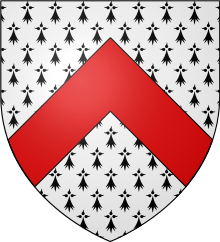George Tuchet, 1st Earl of Castlehaven
The Right Honourable The Baron Audley | |
|---|---|
 Arms of Tuchet: Ermine, a chevron gules | |
| Member of Parliament | |
| In office 30 September 1566 – 5 April 1614 | |
| Personal details | |
| Born | George Tuchet c. 1551 |
| Died | 20 February 1617 |
| Spouses | Lucy Mervyn (before 1584)Elizabeth Noel (m. 1611) |
| Children |
|
| Parent |
|
George Tuchet, 1st Earl of Castlehaven (c. 1551 – 1617),[1] was the son of Henry Tuchet, 10th Baron Audley (died 1563) and his wife, née Elizabeth Sneyd.
Career
He succeeded his father as 11th Baron Audley and 8th Baron Tuchet on 30 December 1563, and served in the Parliament of England from 30 September 1566 to 5 April 1614. He was a Fellow of Magdalen College, Oxford. He was Governor of Utrecht in the Netherlands, and Governor of Kells, County Meath, Ireland. He was wounded at the Battle of Kinsale, 24 December 1601. He resided primarily in Ireland and was summoned by writ to the Irish House of Lords on 11 March 1613/1614.
He was created 1st Baron Audley of Orier (County Armagh) and 1st Earl of Castlehaven (County Cork) on 6 September 1616 in the Peerage of Ireland.
Marriages
Before 28 August 1584, he married Lucy Mervyn, who died before April 1610,[2] only daughter of Sir James Marvyn (1529–1611) and his first wife Amy Clarke[3] from Fonthill Gifford, Wiltshire.[4]
They had seven children:
- Eleanor Tuchet (1590–1652), who married:
- Sir John Davies,[5] attorney of the king.
- Sir Archibald Douglas 7th of Tilquhillie (died 1644).[6][1]
- Mervyn (1593–1631)[1]
- Sir Ferdinando Tuchet K.B., who married the widow of Sir John Rodney.[1]
- Anne Tuchet, who married Edward Blount Esq.[1]
- Elizabeth Tuchet, who married:
- Sir John Stawell of Cothelstone, and had a son John Stawell.
- Sir Thomas Griffin.[1] In 1603 Griffin hosted Anne of Denmark at Dingley, and Elizabeth, Lady Griffin attended the queen's funeral in 1619.[7]
- Maria Tuchet, who secretly married Sir Thomas Thynne of Longleat[8][1] creating years of litigation.[9]
- Christian Tuchet (c.1587 – before 1646),[1] who married Sir Henry Mervyn, son of Sir James's distant cousin Edmund Esq, of Durford Abbey, Sussex. Adopted son and co-heir of her grandfather Sir James Marvyn.[10][11] Henry, who was knighted in 1619, sold the Fonthill estate to his brother-in-law, Mervyn.[12] They had at least two sons:[12]
- James Mervyn
- Sir Audley Mervyn
On 29 August 1611, at St. Mary-le-Strand, Middlesex, he married his second wife, Elizabeth Noel (died 1644), the daughter of Sir Andrew Noel (died 1607) and his wife, née Mabel Harington. The couple had no children.[1]
The administration of his will was granted to his daughter Eleanor, wife of Sir Archibald Douglas. He was succeeded as Earl of Castlehaven by his son, Mervyn. His widow married Sir Piers Crosby on 6 March 1618/19, and was living in 1644.
References
- ^ a b c d e f g h i Burke, Sir Bernard (1866), A genealogical history of the dormant, abeyant, forfeited, and extinct peerages of the British empire, retrieved 8 December 2010
- ^ "Lucy Mervyn". Peerage (The). Retrieved 4 January 2020.
- ^ Dakers 2018, p. 20.
- ^ Burke, John (1833). The Portrait Gallery of Distinguished Females: Including Beauties of the Courts of George IV. and William IV. E. Bull. pp. 43–. Retrieved 5 January 2020.
- ^ David Nash Ford's Royal Berkshire History, Eleanor Touchet
- ^ "Eleanor Touchet". Peerage (The). Retrieved 4 January 2020.
- ^ John Nichols, Progresses of James the First, vol. 3 (London, 1828), p. 541.
- ^ Dakers 2018, p. 22.
- ^ Hartley, Cathy (15 April 2013). A Historical Dictionary of British Women. Routledge. ISBN 978-1-135-35533-3.
- ^ P.W. Hasler, ed. (1981). "MARVYN, James (1529–1611), of Fonthill Gifford, Wilts.". The History of Parliament: the House of Commons. Vol. 1558–1603. Boydell and Brewer. Retrieved 4 January 2020.
- ^ Dakers 2018, pp. 21–22.
- ^ a b Dakers 2018, p. 23.
- Dakers, Caroline (2018). Fonthill Recovered: A Cultural History. UCL Press. ISBN 978-1-78735-045-8.
